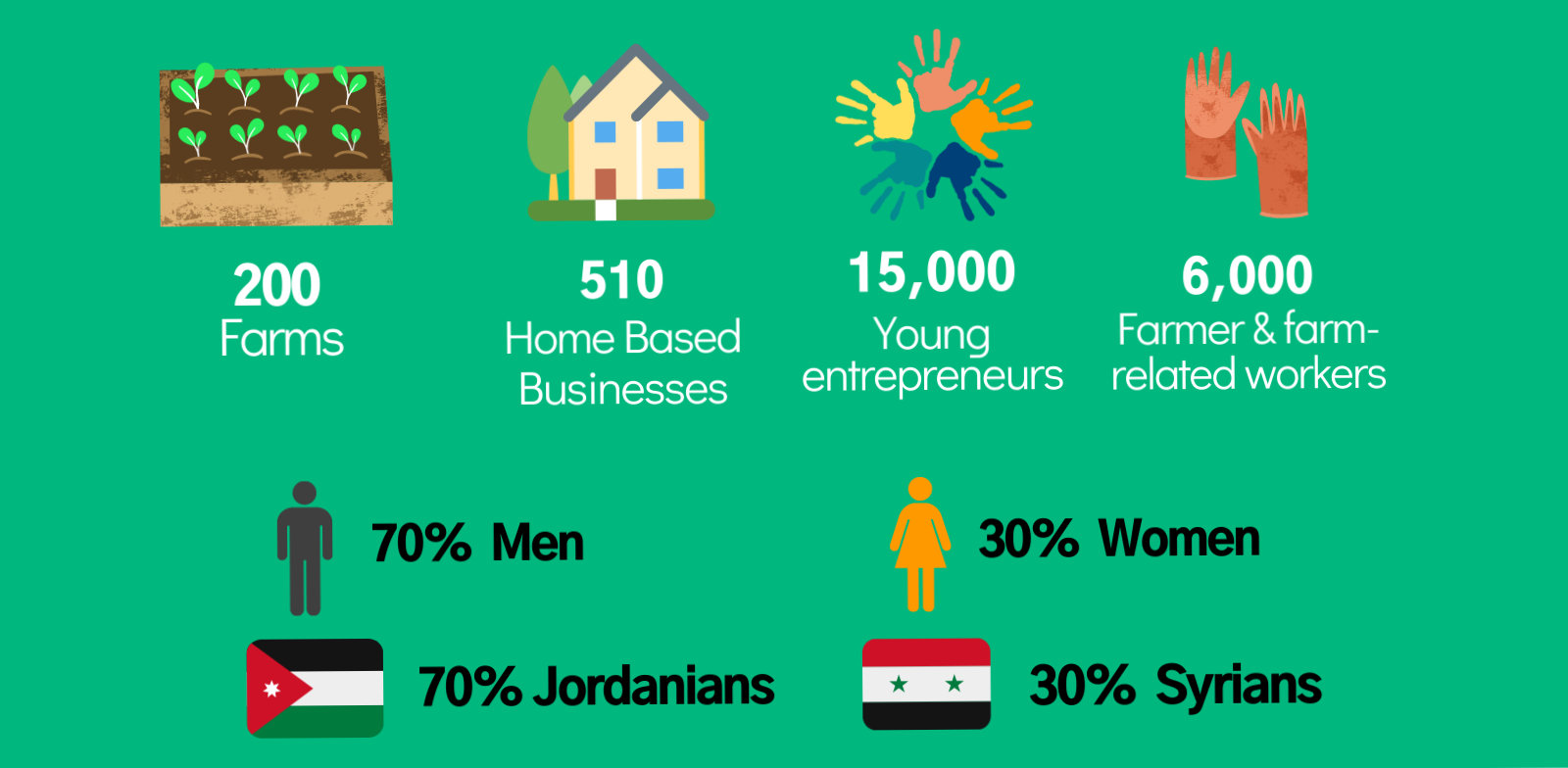About Smart DESERT
Agriculture in Jordan
Agriculture plays a key role in the global economy as it contributes to promoting food security while reducing unemployment worldwide. Climate change and water scarcity slow production rates, destroy crops, and reduce harvest yields, negatively impacting economic growth, livelihoods, and food security.
Jordan is considered the second largest refugee-hosting country in the world, placing additional pressure on its already scarce natural resources, especially water. Jordan’s agricultural policy has shifted towards sustainable management of water resources, food sovereignty, and agricultural exports, as the agriculture sector makes up 75% of Jordan’s total water consumption. The agriculture sector is also one of the largest sectors employing Syrian refugees and vulnerable Jordanians.
Smart DESERT Project Activities
The Smart Development of Eco-Friendly Solutions and Economic Regional Agricultural Techniques (Smart DESERT) project contributes to the new Jordanian agriculture policy initiatives by increasing self-dependence in food production, developing agricultural resources, and improving the efficiency of water use. Project activities aim to create sustainable livelihoods and new job opportunities, increase incomes, improve working conditions, and provide opportunities for home-based business development for vulnerable Jordanians and Syrian refugees working in the agricultural sector in north-eastern Badia, Mafraq, Zarqa, Jerash, and Ar Ramtha districts of Irbid Governorate.
Under Smart DESERT, 15,000 farmers and young entrepreneurs interested in agriculture will be trained. Trainings will build participants’ capacity to reduce production costs through efficient use of energy, solar power, and water management systems. A smart phone application will also be developed to provide farmers with an early-warning system for natural disasters. Using artificial intelligence to extrapolate information on weather conditions and weather forecasting, the application will protect farmers and their crops against floods, locusts, frost, and other risks.
The project will improve working conditions for farmers and advocate for home-based business owners’ rights through advocacy campaigns. Ten awareness-raising campaigns will be led by local community members advocating for the creation of work environments that ensure labor rights are met and proper health and public safety conditions are established for male and female farmers.
The project will also support 500 agricultural home-based businesses and 200 farms over three years (2021-2023) in the north-eastern Badia region. Home-based business owners will receive legal support throughout the registration and licensing process. They will also receive business counseling through trainings and business development services. Home-based projects will be linked with local markets and electronic marketing platforms, providing them with opportunities to display their products and access new markets. In-kind support will also be provided based on need.
A business support incubator – the first of its kind in the agricultural sector – will be established to provide farmers and entrepreneurs with technical, legal, and business support services. The incubator will have several meeting rooms that can serve as spaces for innovation, knowledge-sharing, trainings, and other events for farmers and young people interested in agriculture. The incubator will also launch the Smart DESERT Company, which will train farmers and home-based business owners on improved packaging and marketing methods to grow their businesses and increase their access to local and global markets.
Funders and Implementers
The Smart DESERT project is funded by Agence Française de Développement (AFD) within the MINKA initiative, which aims to mitigate the regional, social, and economic challenges created by the Syrian refugee crisis in the Middle East, especially in Jordan, through a financial grant of 10 million euros.
The project will be implemented under the supervision of the International Union for Conservation of Nature (IUCN) and within a coalition of the following organizations: Blumont Inc., Horizons, GreenTech, and the International Islamic Network for Water Resources Development and Management (INWRDAM) in partnership with the National Agricultural Research Centre (NARC). Each organization plays a designated role in supporting and implementing the project.
Union for the Mediterranean
The Union for the Mediterranean (UfM), endorsed a new cooperation project with Smart DESERT to address the issue of shortage in water in Jordan and enormous pressures on the sewage network and wastewater treatment plants due to extreme water scarcity which have been aggravated by an increasing influx of refugees since the year 2011. The Union for the Mediterranean (UfM) is an inter-governmental organization that promotes cooperation and dialogue in the Euro-Mediterranean region through initiatives addressing the three strategic objectives of regional stability, human development and regional economic integration
